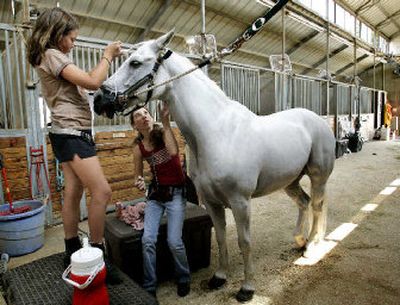Horse industry hopes study will make hay

RICHARDSON, Texas — Freya Warren scooped up a handful of hay on the floor of her 21-stall horse barn.
She turned the yellow shoots over in her palm, satisfied that the mixture had enough large stalks — too fine and the horses will swallow the hay without chewing, causing digestive problems.
Warren had reason to be picky. She had just taken a delivery of fresh hay — $5 apiece for 261 bales, or more than $1,300. And that’s just the start of Warren’s expenses, including the salaries of four employees, $5,000 a year for insurance, $800 a month for feed, and $300 a month to haul away all the manure.
It’s the same story across Texas, the nation’s No. 1 horse state, and hundreds of stables, breeders and training farms around the country, who support a network of veterinarians, farriers and tack shops.
Deloitte Consulting LLC estimates that the horse industry contributes $39 billion to the U.S. economy. That covers everything from the cost of saddles and salt blocks for backyard ponies to the earnings of millionaire jockeys and trainers at the nation’s thoroughbred racetracks.
When indirect costs are included — the money spent at grocery stores, car dealers and dry cleaners by people who work in the business — the economic impact is $102 billion, according to the consultants.
Several horse racing groups paid for the study, which the American Horse Council released last week.
According to the report, the owning, showing and racing of horses supports 1.4 million jobs. The consultants say there are 9.2 million horses in the United States.
That would be an increase of about 2 million since the last survey of this type nearly 10 years ago. Horse fanciers say there is a nostalgic yearning for simpler times, when horses were a part of daily life, doing chores and providing transportation.
“Even though they’re not used as much in commerce as they once were, horses are still an important part of many people’s lives,” said Jay Hickey, president of the horse council. “It’s an agribusiness. It’s a sport. It’s gaming. It’s a breeding industry.”
Hickey said the horse groups had no particular aim for the study other than getting fresh research on their industry. However, trade groups in Washington frequently use such studies when lobbying Congress and the executive branch for policies that would help their industry, and the horse lobby has several of those.
Equine groups are pushing for more favorable capital-gain tax treatment of horses. They want to be eligible for federal disaster relief. Several states allow slot machines at racetracks, and racing interests in others, including Texas, want to do the same. They generally oppose laws that would ban or limit Internet betting.
According to the Deloitte study, owners spend an average of $2,900 per year on their horses — double that for racers.
David O’Connor, who won gold medals in equestrian events at the 1996 and 2000 Summer Olympics, said cost is a challenge for the sport.
“Not everybody can afford to own a horse, especially in urban areas,” O’Connor said. “We’ve got to build up clubs so people don’t have to own a horse but can come out and enjoy riding as a family experience, like soccer or tennis.”